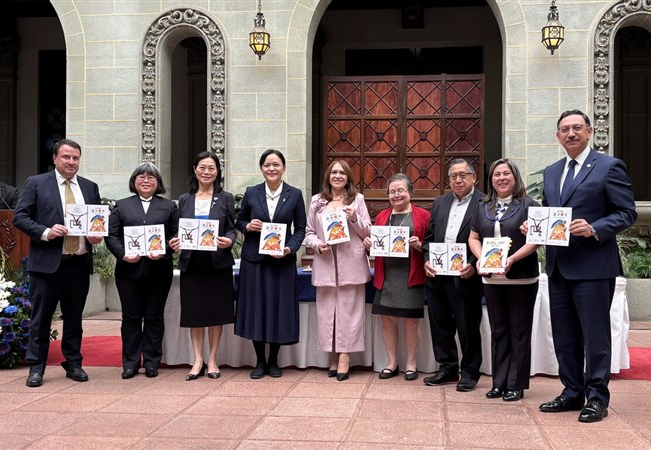In a landmark cultural initiative underscoring the deepening ties between Taiwan and Guatemala, a traditional Chinese-language translation of the “Popol Vuh”, the sacred narrative of the Mayan Kʼicheʼ people, was officially launched at Guatemala’s National Palace of Culture on April 23, 2025.
The launch of this translation, only the second official international version after Portuguese, signals a powerful step forward in cultural diplomacy, academic exchange, and the preservation and global sharing of indigenous knowledge systems.
🔍 What is the Popol Vuh?
The Popol Vuh is a foundational text of the Mayan civilization, chronicling creation myths, historical events, and cosmological insights of the Kʼicheʼ Maya people. It was originally written in classical Kʼicheʼ using Latin script post-Spanish conquest, preserving oral traditions that date back centuries before colonial contact.
Often referred to as the “Mayan Bible,” it includes:
- The myth of the Hero Twins.
- The origin of humanity from maize.
- The cosmic battles between gods and primordial forces.
- The genealogies of Kʼicheʼ rulers.
🇹🇼🇬🇹 The Taiwan-Guatemala Collaboration
Taiwan’s Tzu Chi University, known for its humanitarian and educational work, partnered with the Guatemalan Embassy in Taiwan and Guatemala’s Ministry of Foreign Affairs to bring this complex literary and spiritual work to a Mandarin-speaking audience. The launch coincided with World Book and Copyright Day — an intentional move to emphasize the importance of knowledge preservation and accessibility.
Ambassador Chang Chun-fei (張俊菲) highlighted the translation as a “cultural bridge”, while Guatemala’s Deputy Minister of Foreign Affairs Maria Luisa Ramirez called the book “a symbol of national identity” and praised its potential to inspire new generations in Taiwan and Guatemala alike.
🎓 Academic Perspective
Professor Shin Ya-ju (石雅如) of Tzu Chi University led the translation effort, describing it as more than a linguistic exercise. “It’s a thread connecting civilizations,” she remarked. “We are not only translating words — we are reviving a worldview.”
University President Ingrid Y. Liu (劉怡均) expressed hope that this milestone would pave the way for future collaborations in education and healthcare, reinforcing Taiwan’s longstanding commitment to soft power and international goodwill.
🌏 Why This Matters: Cultural Soft Power and Geopolitical Significance
Taiwan’s support for such translation efforts is part of a broader soft diplomacy strategy, particularly in Central America — one of the few regions where Taiwan maintains formal diplomatic ties. As Guatemala continues to recognize Taiwan over the PRC, projects like these strengthen bilateral relations through cultural appreciation rather than just political allegiance.
Moreover, introducing Mayan literature into Chinese academia could trigger a cross-cultural academic discourse, potentially introducing new comparative mythology, anthropology, and literature curricula in Taiwan and beyond.
🤝 A Future of Cultural Diplomacy
In an age of geopolitical tension, this event serves as a reminder that language, culture, and education can be powerful tools of international engagement. The Popol Vuh, once hidden from colonizers and nearly lost to history, now has the opportunity to educate and inspire people from a completely different civilization — thousands of miles away — thanks to this collaboration.
📌 FAQs
What is the Popol Vuh?
It is a sacred text of the Kʼicheʼ Maya, containing creation myths, cosmology, and the origin of humanity from maize — central to Mayan identity.
Why translate it into traditional Chinese?
To make the Mayan cultural legacy accessible to Chinese-speaking audiences and to promote cross-cultural understanding between Taiwan and Latin America.
Who translated the Popol Vuh into Chinese?
The translation was conducted by Professor Shin Ya-ju and a team at Taiwan’s Tzu Chi University.
What’s the significance of this translation?
It enhances Taiwan’s cultural diplomacy and strengthens bilateral ties with Guatemala, while preserving and sharing indigenous literature globally.
Will the translated version be used in education?
Yes, Tzu Chi University and likely other institutions plan to integrate it into comparative literature, history, and cultural studies programs.


